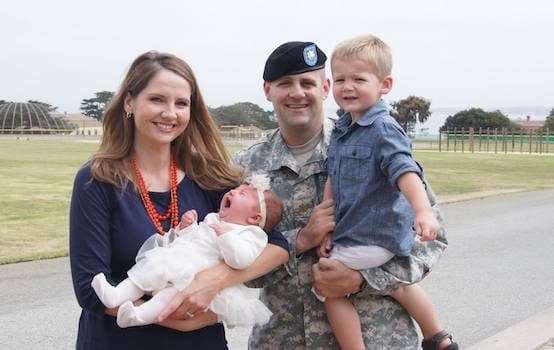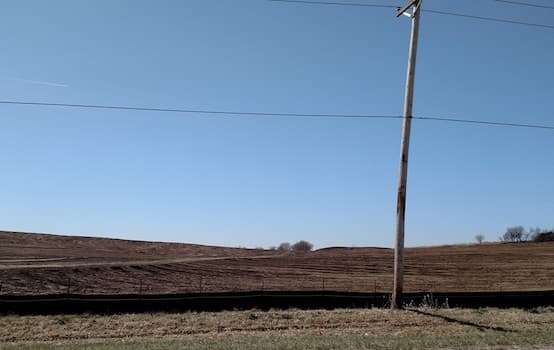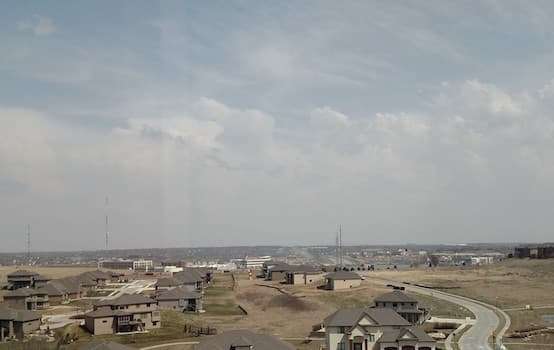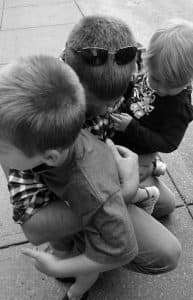
Serving in the armed forces has its share of burdens, from frequent moves to extended time away. The military does, however, does give you a different perspective on America and what being American means.
I recently enjoyed four weeks off following a six-month deployment to Afghanistan (my fourth)—time off being relative, of course. I was only home early for the birth of our third child, prior to moving to Hawaii. At any rate, I spent nearly a month in our hometown of Papillion, Nebraska, where my wife and children had been spending my deployment.
While we had visited them at least yearly up until then, these were short-term, family-oriented trips, without time to take in changes. The combination of a new baby, packing and organizing for the move, and being as close to any home I’ve had since joining the Army at 17, made me nostalgic. It gave me an eye to the changes in my hometown and how they might relate to larger changes in the American cultural landscape. My time off also allowed for reflection on the growing civilian-military divide, something my family feels acutely.
Papillion is at the southern edge of the greater Omaha metropolitan area, one of the American suburban pods or city-states Robert Kaplan described in his 1996 book An Empire Wilderness. Kaplan predicted that areas like St. Louis, Atlanta, and Houston would increasingly aggregate power, creating local identities to the detriment of state/national consensus. Suburbanization only accelerates this fracturing.

A former homestead farm with topsoil cleared prior to construction of a suburb.
(John Q. Bolton)
An irony of American history is that our country filled up at its edges before its center. Pioneers largely passed the “Great American Desert” for the fertility of Oregon’s Willamette Valley. The American interior lacks water and predictable weather but has some of the best farmland in the world. American history largely consists of colonizing our great middle, with the courage of settlers and soldiers balanced against the atrocities wreaked on the Plains tribes. The changes across this grass sea occurred despite the region’s climate and geography. The magnitude of change was apparent to me during my month at home.
In the two decades since I’d left, settlement, suburbanization, and sprawl had fashioned enormous changes throughout Eastern Nebraska, stripping the formerly small community of much of its character, consuming the prairie in endless shopping centers and homogeneous neighborhoods separated into class-based clusters.

Omaha’s unending, treeless housing development.
(John Q.Bolton)
Though Omaha’s robust insurance, farming, and service sectors helped the metro largely escape the 2008 recession, this growth was not without cost. The smaller retail spaces where my friends and I would pass the summer days running errands were gone, replaced by huge concrete pastures “anchored” by a Target, Walmart, or Sam’s Club. The older, smaller spaces were mostly empty, now filled with medical offices, dog groomers, and seasonal shops. I was told one large retail space had hosted six major chains in 10 years after a large supermarket failed. Everywhere, large, faded signage seemed like ghosts of the previous tenants. One plaza where a Walmart had supported multiple smaller shops was now an impromptu used car lot. That Walmart had moved a few blocks over to a new neighborhood and, I was told, a better tax package. In case shoppers needed goods in greater bulk, a new Sam’s Club was a block to the south.
In a way, the state of these public spaces reflects the thinning of American political culture. It occurred to me that our military must also change as our culture becomes increasingly lonely through “radical individualism,” as Yuval Levin describes it in Fractured Identify, and our national identity itself dissolves as suburban pods grow. This fracturing of the national consensus—and the public ambivalence about our never-ending wars—hits military families hard, particularly spouses.
Though only 1 percent of the nation is in uniform, the more alarming trend is that military service is increasingly a family affair. Coupled with the localized recruitment and basing in the West and Southeast, we are quickly evolving into a praetorian military culture. The tenor of discussion while I was home reflected this reality.
I found people expecting me to confirm things they already believed about our military in order to affirm their confidence in America. The trouble is I don’t share that confidence. My 40 months deployed since 2006 have left me with a hard edge. To be sure, I am proud of my country and certainly feel a strong desire to continue service past my thankfully short time left in uniform. But I temper that loyal desire with hard-earned realism about the capacity of the military to deliver on the blind faith the public reposes.
Perhaps condescendingly, I felt most people back home were naïve or at least perpetually misinformed. Consideration or debate beyond the platitudes didn’t occur. No matter their education or worldliness, most Americans retain their supremely American-esque limited interest in politics and foreign and military policy. Much-needed realism, if not satire, is absent from our sacred military, because the public either regards it as sacrosanct or detestable. Worst of all, the public is apathetic about their military.

(John Q. Bolton)
From otherwise considerate and intelligent friends and family I heard comments like “Hope your killing lots of those f–kers” and “Kick some ass over there,” despite the lack of any serious, let alone existential, threat to the American homeland posed by extremists in Afghanistan. Even well-meaning people, it seems, don’t want to understand what our policies hath wrought, at home and abroad.
Many consider it patriotism, but this feeling is specious, insipid, and self-destructive. Calls to “do something” ignore the two-fold genesis of terrorist threats against us: domestic instability in Islamic countries and American actions. The truth is that America is exhausting itself in internecine wars of choice across the greater Middle East—actions that exacerbate instability. War has bankrupted our nation during a time of effective peace, without any discernible threat comparable to the costs, though the media certainly doesn’t help the public see the threat clearly. The wars have also contributed to our fractured politics, as we ignore guns versus butter by using debt and conduct specious freedom versus security arguments.
America is “fast becoming a country undone by war.” As Christianity declines, Americans have chosen a less demanding, syncretic national religion: military hero worship. I’m not a hero, but I felt people wanted me to affirm their beliefs. Rather than turn a skeptical eye toward our militarized foreign policy, Americans seem determined to support the military regardless of cost or efficacy.
I think serious military professionals should find this insulting and disheartening. The military isn’t sacred and its members aren’t all heroes (though military heroes undoubtedly exist in droves). Tragically, military hero worship has created a separate caste of military professionals: effective, well-trained, and distant. It has made the cost of our wars palatable because the human dimension is absent from discussion. Ironically, the military doesn’t have a supply problem—it has a demand problem. It is over-extended, to the detriment of other elements of national power.
After a career fighting them, I can attest that America’s wars are harmful to our people, politics, and liberty—a “form of prolonged ritual suicide.” With no unifying vision or principles, huge swaths of the people have turned tribal. This Sunni versus Shiite breakdown of the American electorate will release shards that leave permanent cultural wounds.
Towards the end of my stay in Nebraska, I drove to the Offutt Air Force Base gym. Taking the long way, I drove over a newly paved road that had a dirt track when I was in high school—we used to drink beer there because no traffic ever came, certainly not at night. Now a four-lane thruway, I passed former homesteads: over a dozen were being demolished as the suburbs encroached. In a process not dissimilar to strip mining, the prairie topsoil was gone, exposing the rich black soil underneath—the same that allows a single American farmer to feed hundreds. A strong wind picked up, grabbing the soil and debris into small dust devils. The dirt swirled for a few seconds, fell, then rose, dissipating in the breeze.
It was a metaphor for the cost of material progress and our unwillingness to discuss it. Our national inheritance being consumed before our eyes for the easy convenience of the present, consumed without thought for the future and the price our children will bear for our recklessness.
John Q. Bolton is an Army officer recently returned from Afghanistan and has had multiple deployments to Iraq and Afghanistan over the last decade. An Army aviator, he holds a B.S. in Mechanical Engineering from the United States Military Academy, an MBA from American Military University, and a Master of Military Arts and Sciences from the Command and General Staff College. This article represents his personal views, not those of the U.S. Army, the Defense Department, or the U.S. government.
Sourse: theamericanconservative.com






